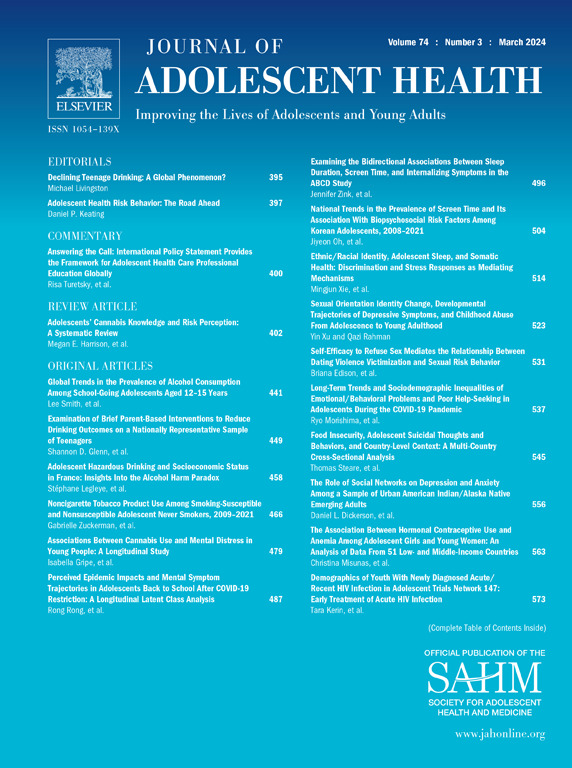在儿科三级医院提供青少年保密护理。
IF 4.5
2区 医学
Q1 PEDIATRICS
引用次数: 0
摘要
目的:如果能确保保密,青少年更有可能披露敏感的健康信息。我们试图评估一家儿科教学医院为青少年患者提供保密护理的频率、质量和相关因素:我们对 2019 年 1 月至 2020 年 1 月期间在一家三级儿科医院就诊的青少年进行了横断面调查。我们对符合魁北克省法律规定的保密医疗条件的青少年(14-18 岁)进行了方便抽样调查,这些青少年在急诊科(ED)或住院治疗后接受了调查。参与者填写了一份自填式电子问卷,内容涉及他们在急诊科或住院部初次就诊时所接受的保密护理。多变量逻辑回归用于确定与提供保密护理相关的因素:共有 406 名青少年完成了调查(急诊室 335 人;住院病人 71 人);137 人(33.7%)同意接受保密治疗,95 人(69%)接受了保密治疗。在接受保密治疗的青少年中,43%的人表示已对保密限制进行了审查,23%的人表示仍会在家人面前讨论隐私问题。多变量分析显示,住院环境(调整赔率[aOR]2.28,1.04-5.01)、女性性别(aOR 2.02,1.21-3.38)、年龄(aOR 1.67,1.03-2.69)、精神病诊断(aOR 8.10,1.47-44.6)、住院医生参与(aOR 1.96,I.09-3.53)均与保密护理的提供呈正相关:讨论:调查结果表明,学术儿科医院提供的保密护理不足。讨论:调查结果表明,在一所学术儿科医院中,保密护理的提供并不充分。保密性的限制没有得到一致的解释,违反保密性的情况并不少见。有必要开展针对保密性的教育活动,以提高三级医疗机构为青少年提供保密护理的频率和质量。本文章由计算机程序翻译,如有差异,请以英文原文为准。
Provision of Adolescent Confidential Care in a Pediatric Tertiary Care Hospital
Purpose
Adolescents are more likely to disclose sensitive health information if confidentiality is assured. We sought to evaluate the frequency, quality, and factors associated with provision of confidential care to adolescent patients at a pediatric teaching hospital.
Methods
We undertook a cross-sectional survey of adolescents presenting to a tertiary pediatric hospital from January 2019 to January 2020. A convenience sample of adolescents eligible for confidential care under Quebec legislation (aged 14–18 years) were surveyed either following their emergency department (ED) or inpatient care. Participants completed a self-administered electronic questionnaire regarding the confidential care provided at their initial ED or inpatient medical encounter. Multivariable logistic regression was used to identify factors associated with the provision of confidential care.
Results
Overall, 406 adolescents completed the survey (335 ED; 71 inpatient); 137 (33.7%) endorsed being offered and 95 (69%) accepted confidential time. Among adolescents receiving confidential care, 43% reported that the limits of confidentiality were reviewed and 23% reported that private issues were still discussed in front of family members. Multivariable analysis revealed inpatient setting (adjusted odds ratio [aOR] 2.28, 1.04–5.01), female gender (aOR 2.02, 1.21–3.38), age (aOR 1.67, 1.03–2.69), psychiatric diagnosis (aOR 8.10, 1.47–44.6), resident involvement (aOR 1.96, I.09–3.53) were all positively associated with the provision of confidential care.
Discussion
Survey results suggest inadequate provision of confidential care in an academic pediatric hospital. The limits of confidentiality were not consistently explained, and breaches in confidentiality were not infrequent. Confidentiality-specific education initiatives are necessary to improve the frequency and quality of confidential care for adolescents in tertiary care settings.
求助全文
通过发布文献求助,成功后即可免费获取论文全文。
去求助
来源期刊

Journal of Adolescent Health
医学-公共卫生、环境卫生与职业卫生
CiteScore
10.40
自引率
3.90%
发文量
526
审稿时长
46 days
期刊介绍:
The Journal of Adolescent Health is a scientific publication dedicated to enhancing the health and well-being of adolescents and young adults. Our Journal covers a broad range of research topics, spanning from the basic biological and behavioral sciences to public health and policy. We welcome a variety of contributions, including original research papers, concise reports, literature reviews, clinical case reports, opinion pieces, and letters to the editor. We encourage professionals from diverse disciplines such as Anthropology, Education, Ethics, Global Health, Health Services Research, Law, Medicine, Mental and Behavioral Health, Nursing, Nutrition, Psychology, Public Health and Policy, Social Work, Sociology, and Youth Development to share their expertise and contribute to our mission of promoting adolescent health. Moreover, we value the voices of young individuals, family and community members, and healthcare professionals, and encourage them to submit poetry, personal narratives, images, and other creative works that provide unique insights into the experiences of adolescents and young adults. By combining scientific peer-reviewed research with creative expressions, our Journal aims to create a comprehensive understanding of the challenges and opportunities in adolescent and young adult health.
 求助内容:
求助内容: 应助结果提醒方式:
应助结果提醒方式:


